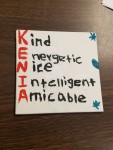What’s in a name?
by Gracie Williams, Guest Blogger
I remember the first time when I called myself “Gracie.” I was in second grade, and I clearly remember my second grade teacher not being able to pronounce my name. She tried several times, and, with each time she attempted it, my classmates laughed. I went home that day and told my mom what happened, and that’s when she said, “Just have them call you Gracie.” From that day forward, I was “Gracie.” At that moment, I felt both a sense of relief and a deep sadness: relief in that I could call myself a name that I was comfortable to share and say out loud without having to repeat it over and over…but it was tempered by sadness because a part of what I knew about myself was being changed…and lost. This was a blow to my self-esteem because I felt that I was changing myself to conform to the comforts of someone else’s perception of me. It’s not easy having a difficult name to pronounce, but, with time, I have learned to accept the challenge and accept that my identity is what I make it regardless of the name I choose.
 No doubt, many of you currently have students in your classrooms who have difficult names to pronounce or different spellings of popular names. The challenge when working with many ELL students is being able to connect with the students on an individual level despite the language barrier. Learning their names and being able to pronounce them correctly is very important for ELL students—especially for new, incoming students. Names are representations of who we are and where we come from. For many students, the significance, spelling, and pronunciation of their name means more to them now that they are in a new, unfamiliar environment. This is not to say that many students won’t change their name, because many will. They may modify their name to include nicknames or even slightly change the spelling of their name, and that is okay because it is their choice. So, for now, embrace those difficult-to-pronounce names and practice rolling your Rs because I promise that, as the teacher,
No doubt, many of you currently have students in your classrooms who have difficult names to pronounce or different spellings of popular names. The challenge when working with many ELL students is being able to connect with the students on an individual level despite the language barrier. Learning their names and being able to pronounce them correctly is very important for ELL students—especially for new, incoming students. Names are representations of who we are and where we come from. For many students, the significance, spelling, and pronunciation of their name means more to them now that they are in a new, unfamiliar environment. This is not to say that many students won’t change their name, because many will. They may modify their name to include nicknames or even slightly change the spelling of their name, and that is okay because it is their choice. So, for now, embrace those difficult-to-pronounce names and practice rolling your Rs because I promise that, as the teacher,  counselor, or school administrator, you being able to correctly say your student’s name means more to them than you will ever know. It is recognizing and accepting them for who they are and what they represent. Names make up who we are; they are part of our identity, and our identity is unshakably tethered to our self-esteem. Promoting positive environments where students feel accepted and connected can help promote school success for the English language learner.
counselor, or school administrator, you being able to correctly say your student’s name means more to them than you will ever know. It is recognizing and accepting them for who they are and what they represent. Names make up who we are; they are part of our identity, and our identity is unshakably tethered to our self-esteem. Promoting positive environments where students feel accepted and connected can help promote school success for the English language learner.
 Included below is a great activity that promotes name association with positive personality characteristic traits. Students can work on beginning to identify positive aspects about themselves and work on being able to share them out loud with each other in a classroom setting.
Included below is a great activity that promotes name association with positive personality characteristic traits. Students can work on beginning to identify positive aspects about themselves and work on being able to share them out loud with each other in a classroom setting.
Self-Esteem Activity
Goal: Students will be able to identify positive personality traits and be able to associate them with themselves.
Materials: Mini canvases, paint, paint brushes, positive adjective worksheet (search the web for an appropriate word worksheet).
Warm-up: Begin the session by talking about positive traits and having students understand the meaning behind each trait.
Activity: Allow students to be creative with the colors and the words that are used. Let them know that, at the end of the activity, each student will have an opportunity to share their project with the class.
Share out: Allow each student to share their name and explain why they chose the personality traits that they used in their project.
 I’d love for you to share how this activity worked for your students and/or how you modified the activity to make it even better. Drop us a note at info@englishlearnerportal.com to share!
I’d love for you to share how this activity worked for your students and/or how you modified the activity to make it even better. Drop us a note at info@englishlearnerportal.com to share!
~~~~~~~~~~~~~~~~~~~~~~~~~~~~~~~~~~~~~~~~~~~
 Graciela Williams “Gracie” is a licensed bilingual school social worker in Annapolis, Maryland. Gracie currently works with newcomer students and runs several social skills groups around the county. She specializes in working with international students who have experienced trauma. She has done extensive work incorporating and facilitating student and parent reunification groups within the school system. Gracie has worked as an Adult ESL teacher and program manager for literacy centers in South Carolina and Colorado. She has a bachelor’s degree in counseling from Bob Jones University and a master’s degree in social work from the University of New England. Gracie is also an Adjunct Professor for Goucher College, where she teaches a graduate level seminar course regarding At Risk Students, and she is an Adjunct Community Faculty for The University of New England providing field instruction to current MSW students.
Graciela Williams “Gracie” is a licensed bilingual school social worker in Annapolis, Maryland. Gracie currently works with newcomer students and runs several social skills groups around the county. She specializes in working with international students who have experienced trauma. She has done extensive work incorporating and facilitating student and parent reunification groups within the school system. Gracie has worked as an Adult ESL teacher and program manager for literacy centers in South Carolina and Colorado. She has a bachelor’s degree in counseling from Bob Jones University and a master’s degree in social work from the University of New England. Gracie is also an Adjunct Professor for Goucher College, where she teaches a graduate level seminar course regarding At Risk Students, and she is an Adjunct Community Faculty for The University of New England providing field instruction to current MSW students.
~~~~~~~~~~~~~~~~~~~~~~~~~~~~~~~~~~~~~~~~~~~~~~~~~~~
Click HERE to join the English Learner Portal mail list! Receive information about our free resources and new online courses as they are released, including an upcoming course by Gracie! Check out our current courses HERE. Check out our Spring/Summer 2018 course list HERE. New courses beginning in March!
English Learner Portal January 2018

